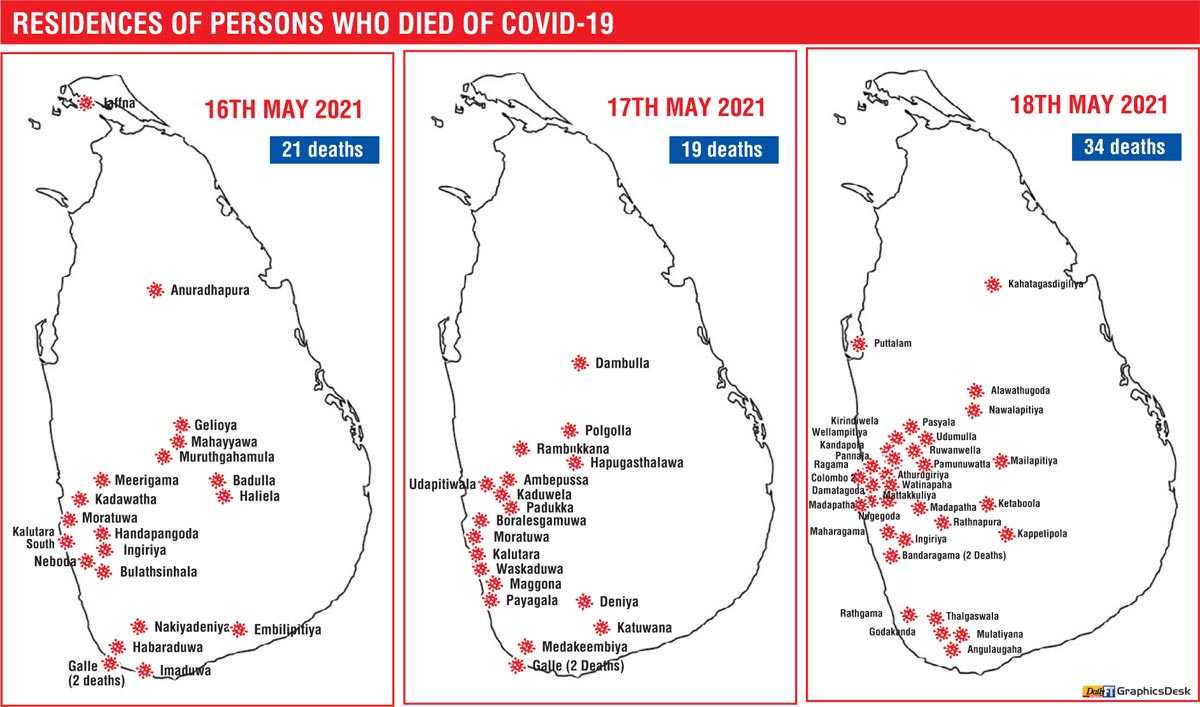Thursday Feb 26, 2026
Thursday Feb 26, 2026
Thursday, 20 May 2021 03:53 - - {{hitsCtrl.values.hits}}

By Shailendree Wickrama Adittiya
Both COVID-19 detections and deaths hit record highs yesterday as cases exceeded 3,000 for the first time and 36 fatalities were reported. The total death toll in the country now stands at 1051, though health officials have warned that the situation could worsen in the coming weeks if all necessary measures are not taken to prevent the spread of the virus.
With daily detections remaining below 1,000 for over a year, Sri Lanka first recorded 1,111 patients on 27 April. Daily detections exceeded 2,000 on 9 May, with the detection of 2,672 patients. A total of 3,623 persons tested positive for COVID-19 yesterday.
“When we detect 2,300 patients having carried out 25,000 PCR tests, there could be two to three times more patients and not just a similar number in society. If you do not limit your movements, this can spread widely and can escalate to a crisis situation,” Primary Health Care, Epidemics and COVID Disease Control State Minister Dr. Sudarshini Fernandopulle said.
When questioned if the rise in patients and deaths was due to a weakness of the Health Ministry, Dr. Fernandopulle said: “I am at the Ministry so I will refrain from saying anything.”
Meanwhile, Senior Consultant Physician at the Infectious Diseases Hospital (IDH) Dr. Ananda Wijewickrama, yesterday said that the manner in which persons behave or act today will have an impact on the country’s COVID-19 situation in three to four weeks’ time. He explained that the current situation was due to the way persons acted three to four weeks ago.
“If we look at the way this has spread in other countries, we can see that we are in a position where there could be a sharp increase in Sri Lanka. We must thus take all possible measures to prevent this situation. It is only by doing so that we can survive this.”
The increase in COVID-19 detections has come with the spread of the B117 UK variant in the country.
A professor attached to the Department of Immunology and Molecular Medicine, Faculty of Medical Sciences of the Sri Jayewardenepura University, Prof. Neelika Malavige plays a key role in genome sequencing required when determining the COVID-19 variant spreading in the island.
The detection of the Indian variant in samples collected from a quarantine centre, as well as the UK variant from samples collected from various parts of the island, has led to an emphasis on the need to adhere to safety guidelines.
According to Prof. Malavige, the World Health Organization has recognised four variants as variants of concern. These are the UK, South African, Brazil, and Indian variants.
“The basis for this classification is if the variants are more contagious compared to other variants, there is a higher chance of complications or death, and vaccinated persons can also contract the variant,” she said.
However, Prof. Malavige stressed that vaccination alone would not prevent the spread of COVID-19. Explaining that the spread of the Indian variant in Singapore has resulted in the implementation of strict measures, including lockdown, Prof. Malavige said: “If we are to consider how this situation arose, all airport workers have received both doses of the Pfizer vaccine. However, they contracted the Indian variant. They did not show symptoms and the vaccines protected them.”
She added that airport staff went on to transmit the disease to those at home, who were not vaccinated, through which the virus spread in society.
Prof. Malavige added that the public must adhere to safety guidelines regardless of the variants detected in the country. She explained that variants are studied in order to provide information to health, epidemiology, and COVID-19 control units.
“Strategies and measures must change depending on the classification of the variants spreading in the country, but the public is always required to follow safety guidelines regardless of the variant.”
The UK variant is prevalent during the third wave of COVID-19 and the emergence of the New Year cluster.
With the detection of 3,623 COVID-19 patients yesterday, the New Year cluster has expanded to 53,857 patients. It is the second largest cluster in the country, with the Peliyagoda cluster having 82,785 patients. The Prisons cluster currently has 5,296 patients and the Divulapitiya cluster has 3,059 patients. The four clusters have a cumulative patient count of 144,965.
This includes the 2,518 COVID-19 patients detected on Tuesday, when 25,397 PCR tests were carried out. Of the patients, 2,459 were from the New Year cluster, 40 were Sri Lankan returnees from abroad, and 19 were from the Prisons cluster. Tuesday’s patients include 391 persons from Kalutara, 350 persons from Gampaha, 333 persons from Colombo, 179 persons from Anuradhapura, and 170 persons from Kegalle.
The district distribution of COVID-19 patients records 41,965 persons from Colombo, 27,652 persons from Gampaha, 12,535 persons from Kalutara, 7,132 persons from Kurunegala, and 6,068 persons from Kandy.
A total of 151,343 persons have tested positive for COVID-19 to date.
At present, 27,925 persons are under medical care, including 595 persons at the Punani Treatment Centre, 490 persons at the Neville Fernando Teaching Hospital, and 479 persons at the Bingiriya Treatment Centre.
Hospitals also have 1,874 persons suspected of having COVID-19 under observation.
According to the Epidemiology Unit, 122,367 persons have recovered from COVID-19 to date. This includes the 1,222 persons discharged yesterday, of which 97 were from the Dambadeniya Treatment Centre, 93 were from the Kopai Treatment Centre, and 66 were from the Punani Treatment Centre.
